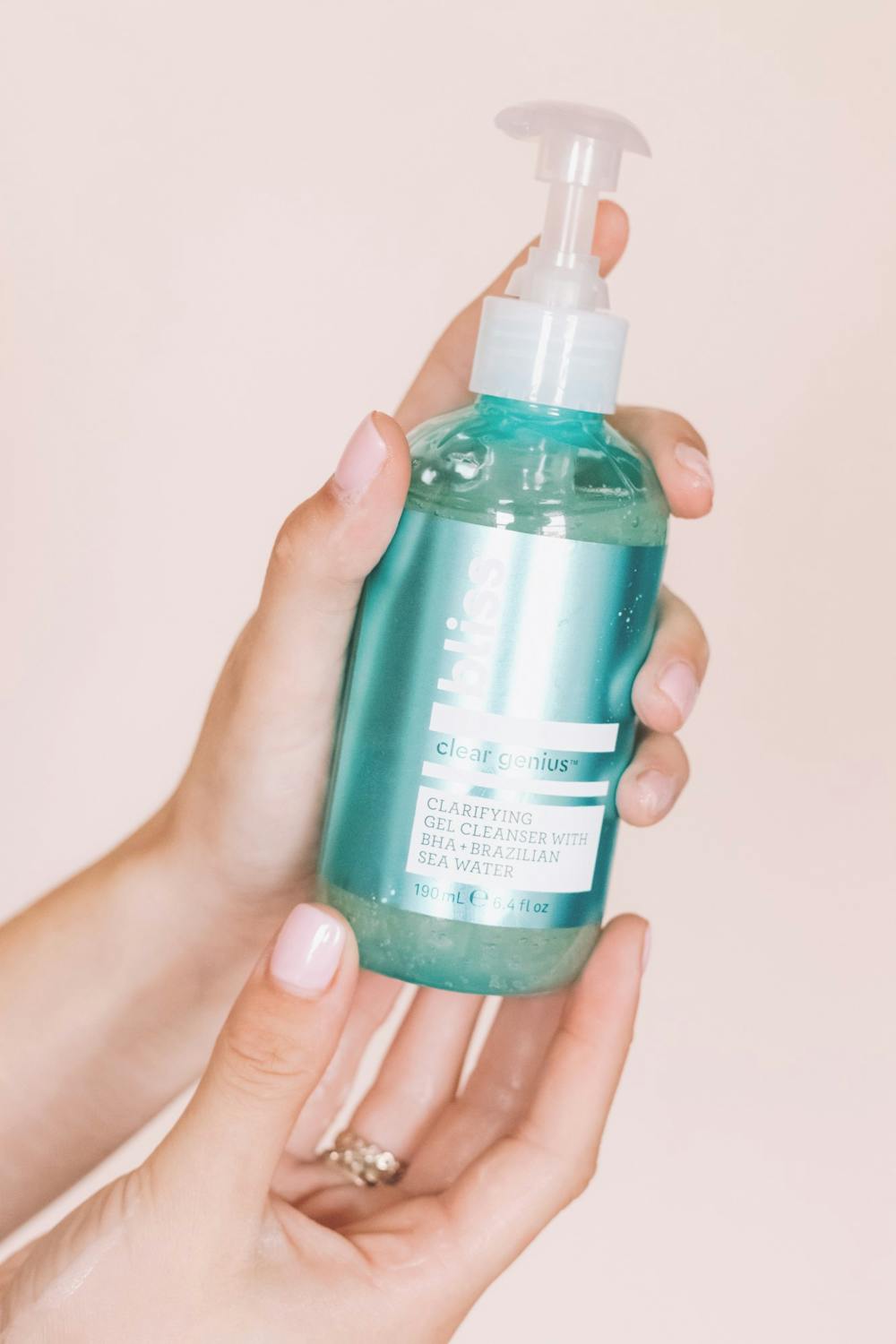Like most of you, my acne first appeared when I was in middle school. However, mine was so bad I had to go to the dermatologist because over-the-counter products were ineffective. My dermatologist prescribed me Retin-A, a product targeting acne. After a few months, my skin was manageable and my acne became mild. However, college changed everything. Between eating too much Chick-fil-A (thanks, Russell House), becoming less active (walking up the Bull Street hill was not enough exercise), and dealing with new stressors, my skin regressed to how it was all those years ago. I was devastated because I naively thought that chapter in my life would be closed forever. As if things couldn't get any worse, my skin also stopped reacting to the Retin-A and other treatments my dermatologist prescribed.
Then, my dermatologist prescribed what she called “the last resort.” I knew she was talking about Accutane. After all, its infamous reputation is well-known in the skincare world. Accutane is a daily pill that is controversial because of the sometimes intense side effects which include mood swings, joint pain and birth defects if you were to get pregnant. The prescription is so strong that all patients are required to get monthly blood tests, and female patients have to take monthly quizzes about the dangers of getting pregnant while on the medication. Honestly, I didn’t care about any of that at the time because I knew Accutane was a prolonged cure for acne and I wanted to close this chapter for good. But yes, the experience was just as bad as you’ve probably heard.
Do’s and Don’ts
1. Do monitor how your skin reacts to products. “It's going to be a case by case instance,” Christina said. “[You] can be using something already that maybe [you] can’t use in conjunction with something else.”
2. Don’t over-exfoliate. “You can compromise the barrier function of your skin which leads to redness, more acne and inflammation,” Stacey said.
3. Do be mindful of germs. “It is also important to change your pillowcase often and wipe your cell phone down, so those germs aren't transferring to the skin,” Stacey said.
4. Do consider getting a facial a few times a year. “'I'm not saying everyone needs to get a facial all the time, but if you get one when the seasons change, you can at least be happy and educated on the type of skin you have,” Lea said.
5. Don’t touch your face. “I do tell all of my clients as a general rule to keep their hands off of their face unless they are cleansing it or applying products,” Stacey said.
I won’t lie, being on Accutane was probably the worst nine months of my life, and my skin definitely got worse before it got better. The first three months were pure hell because my skin purged really bad. Every pimple that was eventually going to appear over time appeared on my face all at once. It should have been socially acceptable for me to wear a brown paper bag over my face at that point. I also felt like I was cursed because I hit so many milestones while on Accutane and didn’t post any of the pictures because I had huge pimples all over my face. How is anyone going to believe I actually saw the rapper Vince Staples at Disney World if it’s not posted on Instagram? Woe is me. Additionally, my skin became dry and my lips turned red because they were peeling so much. So red, that my family and friends always asked if I was wearing lipstick. Welp.
At month five, I was finally seeing results and I couldn’t believe my eyes. My dermatologist said it was going to take time, but I didn’t imagine it would take as long as it takes for someone to carry a baby. But who cares, it actually worked. After this grueling experience, I look at skincare as less about vanity and more about feeling comfortable in your own skin. It’s hard to look into the mirror and be unhappy with what you see, especially if it’s something you feel you have some control over.
While Accutane is a prolonged cure for acne, I still have breakouts like any other normal person; it’s just manageable now. I also have skin concerns beyond acne and my own skin goals. After enduring my own adolescent skincare journey, I realized how lucky I was to be able to afford trips to the dermatologist. That’s why I believe skincare education should be accessible to everyone regardless of money and privilege.
Over three weeks, I spoke to three local estheticians and asked them for their advice on how college students can build a skincare routine on a budget. This entire routine can be completed with drugstore products.
Lea Cates is the lead esthetician at Occo Luxury Spa in the Vista and has been an esthetician for four years. Christina Cropp-Watson is the lead esthetician at Pout Skin Studio on Devine Street and has been an esthetician for over 10 years. Stacey Overstreet is the owner and lead esthetician at Stacey O. Studios on Devine Street. She has been an esthetician for 13 years.
*If your budget is tight, stick to a cleanser, serum, moisturizer and sunscreen.
How to build a skincare routine

1. Double Cleanse
The frst cleanser is used to remove dirt and make-up from the day. This can be an oil cleanser or something as simple as a make-up wipe, Lea said. The second cleanser should be suited for your skin type. If you have dry skin you should opt for a cream cleanser, and if you have oily skin you should use a foam or gel cleanser. The oil cleanser is only required at night.
2. Exfoliate (twice a week at night)
Exfoliation is the act of sloughing away dead skin cells. Christina says your other skincare products won’t even penetrate properly if you haven’t exfoliated. “Think about the skin being like a brick wall, and if it's not exfoliating, everything's just running into that brick wall, and it can't get past the wall. So, exfoliation helps break down those dead skin cells, get them out the way so your new beautiful skin cells can shine bright and just glow,” Christina said. She recommends that you use an exfoliant such as a granular scrub at home and leave chemical peels to the professionals. Exfoliation can also help lighten dark spots from acne scars, also known as hyperpigmentation.
3. Toner
After cleansing, it’s best to use a toner so you can reset your skin to a neutral pH level and remove dirt your cleanser may have missed. “Years ago, a lot of cleansers actually sort of like stripped the skin,” Christina said. That means that it's taken the pH level down, so what a toner does is help them actually balance your skin back out to the neutral pH level.”

4. Serum
A serum is a potent product that soaks into the skin and is used to target any of your specific skin concerns. Whether you’re suffering from dark spots, dehydration or fine lines, serums are proven to be one of the most effective skincare products. Popular serum ingredients include vitamin C (dark spots), hyaluronic acid (dehydration) and retinol (fine lines). “You can kind of budget on your cleanser and your moisturizer, but using that serum, and a good serum that has those products in it is really going to help you see results in your skin changing,” Lea said.
5. Moisturizer
Stacey says college students typically suffer from dehydrated skin because they are using products that are too drying in an attempt to get rid of acne. She said using a moisturizer to keep the skin hydrated is how we can maintain a healthy and balanced skin barrier. “The first instinct when you get acne is to dry the heck out of it. We do want to combat excess oil production, but when we skip moisturizer and use the harsher acids/retinols and drying ingredients of typical acne products, your body will just overcompensate by producing more pore-clogging oil,” she said. You can use a heavier moisturizer at night and a lighter one during the day if you’d like.
6. Sunscreen
Stacey, Lea and Christina stress that wearing sunscreen every day is a must and is non-negotiable. According to Stacey, if you start using sunscreen every day in college you will look 10 years younger starting in your 40’s. “Up to 80% of our lines and wrinkles are caused from sun damage. Even if you aren't at the beach, you are still getting exposure from the sun in your car, through the windows in your classroom, etc.,” she said. Stacey recommends using a moisturizer that contains SPF to save time and money. Christina says the idea that people with darker skin do not need sunscreen is a myth. In fact, Christina recommends reapplying sunscreen multiple times a day for maximum protection. Any sunscreen between SPF 30-50 is perfect.


